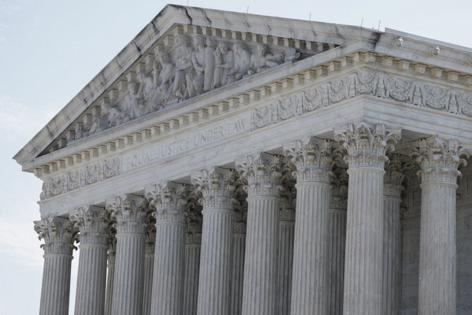Commentary: The Supreme Court owes you an explanation
Published in Political News
“Because I said so” never is persuasive or satisfying. And it certainly should not be regarded as acceptable when it is the Supreme Court resolving important issues — up to and including matters of life and death — without the slightest explanation. Yet, that has been the pattern in recent weeks, as in a series of significant cases the court has handed down rulings without opinions or explanation.
For example, on June 23, in Department of Homeland Security v. D.V.D., the court majority lifted a district court order that prevented individuals from Venezuela and Cuba who were in the U.S. from being deported to South Sudan. The district court had issued a preliminary injunction against so-called third country deportation, finding that the individuals were not given due process: They were not provided sufficient notice or a meaningful opportunity to challenge their deportation based on their fears for their safety. The judge was understandably concerned the individuals could be subjected to torture or death upon arrival. Federal law is specific on where people can be deported to, and there is a strong argument that the Trump administration would violate the law in sending these individuals to a country where they had no prior contacts.
But without a word of explanation, the Supreme Court allowed the deportations to go forward while the case winds its way through the justice system, which could take years. All the while, these swift deportations to third countries can continue.
Justice Sonia Sotomayor, joined by Justices Elena Kagan and Ketanji Brown Jackson, wrote a blistering dissent: “Apparently, the Court finds the idea that thousands will suffer violence in farflung locales more palatable than the remote possibility that a District Court exceeded its remedial powers when it ordered the Government to provide notice and process to which the plaintiffs are constitutionally and statutorily entitled. That use of discretion is as incomprehensible as it is inexcusable.”
In McMahon v. New York, on July 14, the court again lifted a district court order preventing the president from firing approximately 1,400 employees of the Department of Education as part of dismantling that agency. The Education Department was created by federal statute, and it should take an act of Congress to eliminate it.
Many of the 1,400 employees were protected from firing by civil service laws. A federal district court issued a preliminary injunction against the administration’s firing of these individuals and acting to eliminate an agency created by Congress.
Nonetheless, the Supreme Court without explanation allowed the firings to proceed. By the time the slow-moving appeal is heard on its merits, the Department of Education will have been destroyed. And again, Sotomayor wrote a dissent, joined by Kagan and Jackson, objecting to the majority overturning a district court’s carefully reasoned opinion requiring that the Trump administration follow the law.
These Supreme Court orders are no more than “because we say so.” We the people, though, should expect and demand more from the justices.
Since the beginning of American history, the tradition is that the Supreme Court justifies its rulings. The opinions convey that the justices are making reasoned decisions, not merely exercising power. The explanations are important, providing a rationale for the parties in the litigation, as well for the public. Opinions give guidance to lower courts, Congress and state legislatures.
There is a special need for opinions in cases requesting, as these did, swift action to undo what a lower court has done. It is well-established law that a preliminary injunction by a federal district court should be overturned on appeal only in extraordinary circumstances. Such a finding requires showing that the federal district court abused its discretion, a rule that is intended to give great deference to the trial judge.
Among my many concerns with the Supreme Court’s rulings in these emergency proceedings — colloquially known as the shadow docket — is that the justices repeatedly seem to ignore the long-established need for deference to district courts in reviewing preliminary injunctions. And it is even worse when they overrule the trial court without any explanation as to why the judges abused their discretion in granting the preliminary injunctions. There is the strong sense when matters are resolved without any explanation that the justices are just doing whatever they want.
There is no excuse for the court not putting something in writing in these rulings. If there is time for the dissenting justices to write an opinion, as we’ve seen, there is no reason why one of the justices in the majority cannot do so as well. And if the court perceives a need for an especially swift ruling, without time to write an opinion, it can issue its order and then subsequently release the opinion. The justices have done that in the past on occasions.
The stakes in these emergency appeals of district court matters are enormous. These cases pose profound issues with regard to separation of powers and the authority of the president. They often enormously affect real people’s lives. The justices owe it to all involved and to the country to explain their thinking. “Because we said so” is just unacceptable.
____
Erwin Chemerinsky, dean of the UC Berkeley Law School, is a contributing writer to Opinion Voices.
_____
©2025 Los Angeles Times. Visit at latimes.com. Distributed by Tribune Content Agency, LLC.

























































Comments